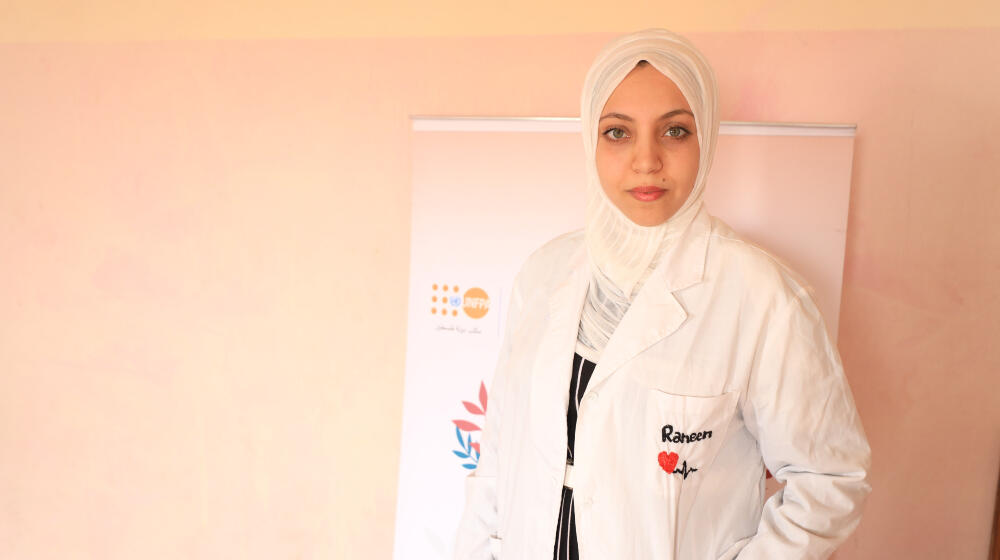It all happened so fast. One minute, Raneen – then a 23-year-old midwifery student – was noting the beginning of her mother’s labor pains; the next, she was helping deliver her own baby sister.
“I urged my mother to go to the hospital, but she didn't listen," Raneen said. “I was astonished by the speed of the process.”
In Gaza, one of the most conflict-mired and densely populated places on earth, the miracle of childbirths takes place day after day. Whether in days of uncertainty caused by continued security instability, pregnant women in Gaza enter into childbirth - 150 births on average every day - each requiring safe and quality care from a health system already on its knees lacking vital resources and personnel from years of hostilities. Midwives play an invaluable role in Palestine during such challenging circumstances. The recent escalation in May 2023, made Raneen, a UNFPA-supported young midwifery student from Rafah in Gaza, recall this particularly challenging experience, both personally and professionally, helping her own mother deliver a baby-girl sister in an emergency childbirth during COVID-19.
“Help me! You’re studying midwifery; you can handle it. Don’t let anything happen to your sister”, Raneen remembers her mother cried out.
"I realized I had to step up - the baby's head was visible. I recalled the training sessions on rapid childbirth. I didn't have any sterile nursing equipment with me, so I used plastic bags to receive the baby and cut off the umbilical cord with a new razor blade,” Raneen explains.
Raneen and her family were in contact with ambulance services, but it was delayed due to their remote location in the Southern Gaza Strip. “I managed to deliver my mother’s placenta just as the ambulance crew arrived. I handed everything over to the paramedics and collapsed into the living room, exhausted and overwhelmed with intense crying and worrying about potential complications for my mother and my baby sister.”
Gratefully, both Raneen’s mother and the baby girl, named Wisam, were healthy. “Wisam” means “a medal” in Arabic. “For me, this delivery is a medal,” says Raneen, referring to her accomplishment of delivering her own baby sister under very challenging circumstances. “The passion of becoming a midwife grew in my heart because of this experience” she commented, blissfully.
The experience only reinforced Raneen’s understanding of the profound importance of midwifery and fueled her passion to become a midwife. "This incident will remain vivid in my memory. Wisam is a symbol of my future success as a midwife,” Raneen concludes.
UNFPA’s support to Raneen and midwives in Palestine
Raneen’s confidence in herself and the successful delivery of Wisam demonstrate the importance of UNFPA’s midwifery support to Palestine, specifically to Gaza. Under the most challenging personal circumstances, Raneen was able to apply what she learned from her enrolment in UNFPA’s tailored training programme for young midwives focusing on the necessary knowledge and skills to provide emergency obstetric care as well as on-the-job training in a wide range of maternal health topics.
Just like Raneen was an angel to her mother and sister in that situation, midwives in Gaza are guardians of life, providing safe and comprehensive care, offering emotional support and guidance for women and families during their most transformative moments. Against all odds, they possess remarkable strength and dedication to bring life into a broken world, instilling hope and resilience where it is needed most.
“To be a midwife in Palestine transcends being merely a profession; it is a calling” says Ms. Reem Miqdadi, UNFPA Sexual and Reproductive Health Programme Analyst in Palestine. “UNFPA is there to equip them in their calling and continue to empower midwives to strengthen sexual and reproductive health services as we strive to ensure that every woman has access to skilled midwives who can provide safe, inclusive, and quality care,” she continued.
Join us in honoring the Palestinian midwives and their immense role in building a future where every birth is safe, every mother is empowered, and every child thrives.





